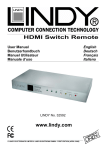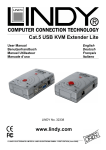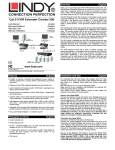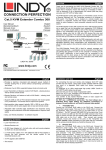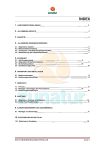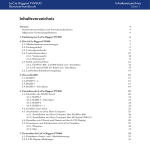Download Lindy HDMI CAT5e/6 Extender 35m
Transcript
HDMI Cat5e Extender Range Manual Benutzerhandbuch Manuel Manuale Uso English Deutsch Français Italiano LINDY No’s. 38010, 38014, 38013, 38001, 38011 & 38012 www.lindy.com © LINDY ELECTRONICS LIMITED & LINDY-ELEKTRONIK GMBH - FIRST EDITION (March 2008) Manual English Introduction Thank you for purchasing one of the products from the LINDY HDMI extender range. This HDMI Extender Range brings you endless possibilities for digital signage, public display and large scale demonstration. Where crystal-clear digital video needs to be broadcasted, these extenders can bring your distribution system to the next level. The complete product range can be easily combined to suit almost every application through low cost Cat5e cable. By taking the advantage of Cat5e cable, installation is simplified and particularly cost effective whether you are splitting or extending the HDMI signal. Features • • • • • • • HDMI signal extension through Cat5e cable Cat5e cable implementation to minimize use of high-cost HDMI cable Ability to cascade HDMI 1.2 compliant, full HD ready & 1080p capable with HDCP support Built in equalizer LED status to indicate the HDMI activity Pure hardware solution Installation 1. Before connecting any device, please ensure everything is powered off 2. Connect the HDMI source to the HDMI extender transmitter device (38010, 38001 Transmitter or 38011 Transmitter) using an HDMI cable 3. Connect one end of the Cat 5/5e/6 cable to the output port on the transmitter and the other end to the input port of the receiver (38014, 38013 or 38011 Receiver) 4. Using another HDMI cable, connect your HDMI display to the HDMI out port on your HDMI extender receiver 5. Repeat step 4 untill all HDMI displays are connected 6. Once all cables are connected to the transmitters and receivers, power on all devices 7. If required, use the EQ control to adjust the picture quality 8. Use LINDY DVI to HDMI cables to connect to DVI devices. (note: most DVI devices do not support audio) 2 Manual English Description 1. Link activity status 2. Local display status 3. Power status 4. Power adaptor input 5. RJ45 out to receiver 6. RJ45 out for cascading (optional) 7. HDMI out: to local display monitor (optional) 8. HDMI in: from HDMI source 9. Equalizer control knob 10. Cat cable in from expander or transmitter 11. HDMI out: to remote display monitor 8-Port HDMI Extender (38010) 1 Front: 2 3 Rear: 5 6 4 7 8 9 HDMI 20m Cat5 Receiver (38014) Input: 10 Output: 11 4 3 Manual English HDMI 35m Cat5e Receiver (38013) HDMI 35m Cat5e Transmitter & Receiver (38001) Input/Transmitter: Output/Receiver: 9 11 4 10 HDMI 50m Cat5e Transmitter (38011) 9 4 6 7 8 HDMI 50m Cat5e Receiver/Extender (38012) 9 4 6 7 10 4 Manual English Installation Examples Example 1. HDMI Display (optional) HDMI Source This scenario shows an HDMI signal from a DVD player with the picture showing on a local HDMI display, and up to 8 other signals up to 35m away using short range extenders. In addition to this the signal is also cascaded in 50m increments up to 200m using long range extenders with a local display every 50m. 38010 – 8 Port HDMI Extender/Splitter Up to 8 ports out Extend up to 50m using 38012 HDMI Display HDMI Display 38013 – up to 35m over Cat5e patch cable Or 38014 – up to 20m over Cat5e patch cable HDMI Display Extend up to another 50m using 38012 Up to 8 HDMI Displays Note: Although not shown in the diagram above, all extenders and receivers need to be powered using the supplied power adapter. 5 Manual English Example 2. This scenario shows the single port HDMI transmitter and receiver over a maximum distance of 35m. The receiver on this set up has an EQ knob to adjust for skew compensation. Power Supply HDMI Source HDMI Cable 38001 Receiver CAT X Patch Cable up to 35m 38001 Transmitter HDMI Cable Power Supply HDMI Display Example 3. 38010 – 8 Port HDMI Extender/Splitter 38014 – up to 20m over Cat5e patch cable 38010 – 8 Port HDMI Extender/Splitter 6 This scenario shows how you can cascade two 8 port splitters together using a short length patch cable (up to 20m) connected to Part No. 38014. This will give you another 8 splitter ports and another port to extend over 50m. Manual English Frequently Asked Questions How does the (EQ) equalizer work? The equalizer is a built in electronic device used to adjust the picture quality. The EQ knob must be turned slowly until the picture is showing the correct quality display. What kind of Cat X cable can I use? We recommend using Cat5e or higher cable for the best display quality at the maximum distances. Also try to use Skew free or SFTP network cable for improved performance. What is the minimum category cable I can use? The minimum Category cable we recommend using is Cat 5e. Using this type of cable may have an effect on the maximum transmission distance than can be achieved. I want to extend further than the standard specification states. You can extend further than the recommend distances by using the highest quality Cat5e/6 cable with no skew and by using 24 gauge HDMI cables. You may get longer distances if you set the resolution to 480P I am using the short range 20m receiver but cannot see an image. This receiver is only intended for short distances, please ensure you are using the correct cable and reduce your resolution to 480i. If the picture is now shown then you may need to use a receiver capable of longer distances. There is no image on the monitor, what could be the problem? Always check that the cables are correctly inserted and all the devices are powered on and check the source device is transmitting the signal. Also try to reduce the output signal from your HDMI source and make sure you are using the minimum recommended network cable. 7 Benutzerhandbuch Deutsch Einführung Vielen Dank für den Erwerb der Produkte aus der LINDY HDMI Extender Palette. Diese HDMI Extender bieten Ihn en eine Vielzahl von Kombinationsmöglichkeiten mit der Sie fast alle Aufgabenstellungen im Digital Signage Bereich, für die HDMI/DVI-Signalverteilung in Einkaufspassagen und anderen Gebäudetrakten abdecken können. Verschiedene Kombinationsmöglichkeiten und Einsatzbeispiele finden Sie auf den folgenden Seiten erläutert. Diese Extender übertragen HDMI Signale ohne Qualitätsverlust in Bezug auf die Signalqualität da Sie die Signale digital übertragen. Die einzelnen Produkte der Palette können weitestgehend miteinander kombiniert werden. Die Überbrückung der großen Distanzen erfolgt mit im Vergleich zu HDMI-Kabeln preiswertem Cat.5/6 Netzwerkkabel. Sollten in Einzelfällen Verbindungsprobleme auftreten, so kann es hilfreich sein höherwertiges abgeschirmtes Cat.6 Kabel zu verwenden. Features • • • • • • HDMI Signalübertragung über günstige Cat.5/6 Kabel statt teurer HDMI-Kabel Möglichkeit der Kaskadierung und Vervielfachung des Signals (Splitter) HDMI 1.2 kompatibel, HD-Ready & FullHD 1080p sowie HDCP-Unterstützung Integrierte Equilizer-Funktion zur Anpassung an Übertragungskabel LED Statusanzeige für anliegende HDMI-Signale Reine Hardwarelösung Installation 1. Stellen Sie sicher dass alle Geräte ausgeschaltet sind, bevor sie sie miteinander verbinden 2. Verbinden sie ihre Signalquellen (HDMI Source) mit den HDMI Cat.5 Transmitter / Sender (38010, 38001 Transmitter oder 38011 Transmitter) durch HDMI oder DVI auf HDMI Anschlusskabel. 3. Verbinden sie die HDMI Cat.5/6 Transmitter- mit den Receivern / Empfängern (38014, 38013 oder 38011 Receiver) mit geeigneten RJ45 / Cat.5/6 Netzwerkkabeln 4. Verbinden sie das Ausgabegerät / Display mit dem Receiver mit geeigneten HDMI oder HDMI auf DVI Anschlusskabeln (DVI Geräte müssen HDCP unterstützen!) 5. Wiederholen Sie die Schritte 2 bis 4 für alle Extender, Splitter und Geräte, die angeschlossen werden müssen. 6. Schließen Sie die Netzteile für die Transmitter und Receiver an 7. Schalten sie alle Geräte ein 8. Wo notwendig, stellen Sie die Equilizer so ein, dass das Signal korrekt übertragen wird 9. Sie sollten jetzt Bild und Ton überall vorliegen haben 8 Benutzerhandbuch Deutsch Beschreibung der Schnittstellen, Anschlüsse & Funktionen 1. Link Activity Status (zeigt aktives Signal an) 2. Local Display Status (zeigt aktiven lokalen HDMI-Monitor-Port Status an) 3. Power Status (Ein / Aus) 4. Netzteilanschluss 5. RJ45 Ausgang zum Receiver 6. RJ45 Ausgang für Kaskadierung (optional) 7. HDMI Ausgang: zum lokalen HDMI-Monitor (optional) 8. HDMI Eingang von der HDMI-Signalquelle 9. Equilizer Einstellregler 10. RJ45 Eingang am Receiver 11. HDMI Ausgang am Receiver,0 zum Display oder zur nächsten Kaskade 8-Port HDMI Cat.5/6 Extender (38010) Vorderansicht: 1 2 3 Rückansicht: 5 6 4 7 8 9 HDMI 20m Cat5/6 Receiver (38014) Eingänge: Ausgang: 10 11 4 9 Benutzerhandbuch Deutsch HDMI 35m Cat5e/6 Receiver (38013) HDMI 35m Cat5e/6 Transmitter & Receiver (38001) Input/Transmitter: Output/Receiver: 9 11 4 10 HDMI 50m Cat5e/6 Transmitter (38011) 9 4 6 7 8 HDMI 50m Cat5e/6 Receiver/Extender (38012) 9 4 6 7 10 10 Benutzerhandbuch Deutsch Installations- und Kombinationsbeispiele HDMI Quelle Beispeil 1. HDMI Display (optional) HDMI DiesQuelle Szenario zeigt die Verteilung eines HDMI Signals von einem DVD Player auf einen lokalen HDMI-Kontrollmonitor, sowie an bis zu 8 Cat.5/6 Receiver über bis zu jeweils 20m (38013) oder 35m (38014) via Cat.5/6 Kabel (links im Bild). 38010 – 8 Port HDMI Extender/Splitter Rechts im Bild wird das Signal über jeweils bis 50m Cat.5/6 an die Long Range Extender (38012) ausgegeben. An diesem Port können maximal 4 Long Range Extender kaskadiert und das Signal bis zu 200m weit übertragen werden. Bis zu 8 Ports Bis 50m (bei Einsatz von 38012) HDMI Display HDMI Display 38013 – bis zui 35m über Cat5e Patchkabel Or 38014 –bis zui 35m über Cat5e Patchkabel HDMI Display Jeder 38012 kann bis zu 50m übertragen Bis zu 8 HDMI Displays Hinweis: Alle Extender Receiver- sowie Transmittereinheiten benötigen ein Netzteil! 11 Benutzerhandbuch Deutsch Beispiel 2. Dies Szenario zeigt eine einfache Verlängerung bis zu einer Maximaldistanz von 35m mit dem Extender 38001. Der Receiver verfügt über einen EQ Einstellregler um die Übertragung an das Verbindungskabel anzupassen. Netzteil HDMI Quelle HDMI Kabel 38001 Receiver Cat.5/6 Patchkabel bis zu 35m 38001 Transmitter HDMI Kabel Netzteil HDMI Display Beispiel 3. 38010 – 8 Port HDMI Extender/Splitter 38014: bis zu 20m mit Cat5e Patchkabel 38010 – 8 Port HDMI Extender/Splitter 12 Dies Szenario zeigt die Kaskadierung zweier 8 Port Extender/Splitter unter Verwendung des 20m Extenders 38014. Am zweiten Splitter können weitere Extender (38012) für bis zu 50m angeschlossen werden. Benutzerhandbuch Deutsch Frequently Asked Questions – Häufige Fragestellungen Wie funktioniert der Equilizer (EQ)? Der Equilizer ist ein einstellbarer elektronischer Schaltkreis zur Anpassung an die Qualitätsverluste des Signals im Übertragungskabel. Drehen Sie den Regler langsam bis das Bild korrekt angezeigt wird. Welche Art von Netzwerk RJ45 Kabel verwende ich am Besten? Wir empfehlen die Verwendung von hochwertigem Cat.5e bzw. Cat.6 Patchkabel. Bei Übertragungsproblemen versuchen Sie es mit einem höherwertigen Cat.6 Kabel. Je nach Gerätepark bringen gut abgeschirmte Kabel weitere Vorteile. Es sollte kein Kabel mit niedrigerer Spezifikation als Cat.5e eingesetzt werden. Ich möchte die Signale über größere Distanzen als die spezifizierten übertragen Bei niedrigeren Auflösungen können Sie in der Regel etwas größere Distanzen überbrücken. Bei Verwendung sehr hochwertiger Cat.6 Kabel (am besten Skew Free / ohne unterschiedliche Längen der Adernpaare) können Sie je nach angeschlossenen Geräten und deren individueller Signalqualität am Eingang sowie am Ausgang ebenfalls größere Kabellänge erreichen. Ich verwende den Extender 38014 (bis 20m) aber ich bekomme kein Bild. Dieser Receiver ist für kurze Distanzen bis maximal 20m konzipiert. Es kann vorkommen, dass HDMI Signalquelle, dieser Extender, das Verbindungskabel und das HDMI Display nicht harmonieren, besonders bei sehr hohen Auflösungen 1080p und Ausnutzung der 20m Distanz. Verwenden Sie in diesem Fall höherwertige Verbindungskabel oder den 35m Extender 38013/38001. Ich bekomme kein Bild Überprüfen Sie zuerst ob alle Kabel wirklich korrekt angeschlossen sind. Stellen sie sicher, dass die Kabel die zulässigen Längen nicht überschreiten. Und ob die Netzteile alle korrekt angeschlossen sind. Schalten Sie gegebenenfalls alle Geräte nochmals aus und vom Display her zur Quelle hin dann wieder ein. Prüfen Sie ob die HDMI Signalquelle korrekt ein Signal ausgibt. Prüfen Sie, ob der Equilizer Einstellregler korrekt eingestellt ist. Falls dies nicht zum Erfolg führt reduzieren Sie die Auflösung die Ihre HDMI Signalquelle ausgibt und prüfen Sie ob dies zum Erfolg führt; falls ja müssen Sie an irgendeiner Stelle die Kabeldistanzen verringern oder hochwertigeres Kabel verwenden. Versuchen Sie dann die Auflösung wieder zu erhöhen. Oder versuchen Sie es mit Extendern für größere Distanzen. Das Ausgangssignal mancher HDMI Geräte / Signalquellen ist qualitativ nicht ausreichend für eine Übertragung über größere Distanzen (z.B. nicht aktuelle sowie Grafikkarten der Low Cost Baureihen!). Verwenden Sie in diesem Fall ein Gerät mit hochwertigerem Ausgangssignal. 13 Français Manuel Introduction Merci d’avoir choisi l’extender LINDY HDMI. Cet extender HDMI vous apporte de larges possibilités pour le signal numérique, l’affichage et la présentation. Il permet également de distribuer de la vidéo sur plusieurs écrans. L’installation s’effectue avec un câble réseau cat5e, et est pratique si vous utilisez un séparez (splitter) ou amplifiez (extender) le signal HDMI. Caractéristiques • • • • • • • Signal HDMI via un câble cat5e Câble cat5e pour minimiser l’utilisation de câbles HDMI coûteux Cascade possible Compatible HDMI 1.2, full HD ready & 1080p, avec support HDCP Equaliseur intégré LED de statut pour indiquer l’activité HDMI Solution purement matérielle (hardware) Installation 1. Avant de connecter un appareil, merci de s’assurer que tout est éteint 2. Connectez la source HDMI à l’unité émettrice HDMI (38010, émetteur du 38001ou émetteur 38011) en utilisant un câble HDMI 3. Connectez le câble cat 5/5e/6 au port de sortie de l’émetteur et à l’entrée du récepteur (38014, 38013 ou récepteur 38011) 4. En utilisant un autre câble HDMI, connectez votre écran HDMI à la sortie du récepteur HDMI 5. Répétez l’étape 4 jusqu’à ce tous les écrans HDMI soient connectés 6. Une fois que tous les câbles sont connectés aux émetteurs et récepteurs, allumez tous les appareils 7. Si nécessaire, utilisez le contrôle EQ pour ajuster la qualité de l’image 8. Utilisez les câbles LINDY DVI vers HDMI pour connecter des appareils DVI (note: la plupart des appareils DVI ne supportent pas le son) 14 Français Manuel Description 1. Statut du lien 2. Statut de l’écran local 3. Alimentation 4. Prise d’alimentation 5. Sortie RJ45 du récepteur 6. Sortie RJ45 pour cascade (optionnel) 7. Sortie HDMI: vers écran local (optionnel) 8. Entrée HDMI: depuis la source HDMI 9. Bouton de contrôle de l’égaliseur 10. Entrée RJ45 de l’émetteur de l’extender 11. Sortie HDMI: vers l’écran distant Extender 8 ports HDMI (38010) 1 Façade: 2 3 Arrière: 5 6 4 7 8 9 Récepteur HDMI 20m cat5 (38014) Entrée: Sortie: 10 11 4 15 Français Manuel Récepteur HDMI 35m cat5e (38013) Emetteur & récepteur HDMI 35m cat5e (38001) Entrée de l’émetteur: Sortie du récepteur: 9 11 4 10 Emetteur HDMI 50m cat5e (38011) 9 4 6 7 8 Emetteur/extender HDMI 50m cat5e (38012) 9 4 6 7 10 16 Français Manuel Exemple d’installation Exemple 1. Ecran HDMI optionnel Source HDMI Ce schéma présente un signal HDMI d’un lecteur DVD avec image affichée sur un écran HDMI local, et jusqu’à 8 autres signaux sur 35m maxi en utilisant des extenders HDMI courte portée (35m). Une cascade y est ajoutée, via un extender HDMI longue portée 50m (et jusqu’à 200m) avec un écran local tous les 50m. 38010 –Extender/splitter 8 ports HDMI Jusqu’à 8 ports de sortie Etend jusqu’à 50m avec 38012 Ecran HDMI Ecran HDMI 38013 – Jusqu’à 35m via câble cat5e Ou 38014 – Jusqu’à 20m avec câble cat5e Ecran HDMI Etend jusqu’à 50m avec 38012 Jusqu’à 8 écrans HDMI Note: bien que non présenté dans le schéma ci-dessus, tous les extenders et récepteurs ont besoin d’être alimentés en utilisant l’adaptateur fourni. 17 Français Manuel Exemple 2. Ce schéma présente un émetteur et un récepteur HDMI, distants de 35m maximum. Le récepteur a un bouton de réglage d’égaliseur EQ. Alimentation Source HDMI Câble HDMI 38001 Récepteur Câble CAT X patch jusqu’à 35m 38001 Emetteur Câble HDMI Alimentation Ecran HDMI Exemple 3. 38010 – Extender/ Splitter 8 ports HDMI 38014 – Jusqu’à 20m avec câble cat5e patch 38010 - Extender/ Splitter 8 ports HDMI 18 Ce schéma montre comment vous pouvez cascader 2 splitters 8 ports en utilisant un câble court (jusqu’à 20m) connecté au N° Art. 38014. Vous obtiendrez un autre splitter 8 ports. Français Manuel Question fréquentes Comment l’égaliseur (EQ) fonctionne? L’égaliseur est un appareil électronique utilisé pour ajuster la qualité de l’image. Le bouton EQ doit être tourné doucement jusqu’à ce que l’image soit affichée dans la bonne qualité. Quel type de câble cat X puis-je utiliser? Nous recommandons l’utilisation de câble cat5e ou supérieur pour le meilleur affichage sur une longue distance. Utilisez des câbles réseau SFTP pour améliorer les performances. Quel la catégorie de câble minimale utilisable? La catégorie minimum est le cat 5e. L’utilisation de ce type de câble peut avoir un effet sur la distance maximum de transmission. Je veux étendre plus loin que la spécification standard. Vous pouvez étendre plus loin que les distances recommandées, en utilisant la plus haute qualité des câbles caat5e/6 et en utilisant des câbles HDMI 24 AWG. Vous pouvez obtenir de plus longues distances si vous utilisez une résolution de 480P. J’utilise le récepteur courte portée 20m mais ne peut pas voir une image. Ce récepteur est prévu que pour les courtes distances, assurez vous d’avoir utilisé le câble correct et réduisez votre résolution à 480i. Si l’image est maintenant vue, vous pouvez utiliser un récepteur longue distance. Il n’y a pas d’image sur l’écran, quel est le problème? Merci de vérifier que les câbles soient correctement connectés et que les appareils sont allumés, vérifiez si la source transmet le signal. Essayez de réduire le niveau de sortie de votre source HDMI et assurez vous que vous utilisez le câble réseau minimum recommandé. 19 Manuale Uso Italiano Introduzione Grazie per aver scelto un Extender LINDY HDMI. Questa gamma di Extender HDMI consente di inviare e distribuire segnali video digitali anche su lunghe distanze tramite cavi di rete RJ45. L’utilizzo di cavi di rete Cat5e rende l’installazione estremamente facile ed a basso costo oltre che a semplificare notevolmente la connessione dei cavi. Caratteristiche • • • • • • Estende segnali HDMI tramite cavi di rete Cat5e Possibilità di collegamento in cascata Supporto specifiche HDMI 1.2, full HD ready & 1080p con HDCP Equalizzatore integrato LED di stato Soluzione hardware pura Installazione 1. Prima di collegare qualsiasi dispositivo, assicurarsi che sia tutto spento 2. Collegare la sorgente HDMI al transmitter dell’extender (38010, 38001 Transmitter o 38011 Transmitter) tramite un cavo HDMI 3. Collegare il cavo Cat 5/5e/6 all’uscita del transmitter e all’ingresso del receiver (38014, 38013 o 38011 Receiver) 4. Utilizzare un altro cavo HDMI per connettere il monitor HDMI all’uscita del receiver dell’extender HDMI 5. Ripetere il punto 4 per collegare altri monitor HDMI 6. Una volta collegati tutti i cavi ai transmitter e receiver, accendere tutti i dispositivi 7. Se necessario, utilizzare l’equalizzatore per regolare la qualità dell’immagine 8. Utilizzare cavi DVI/HDMI per collegare dispositivi DVI. (N.B.: dispositivi DVI non hanno il supporto audio) 20 Manuale Uso Italiano Descrizione 1. LED Link activity 2. LED Monitor locale 3. LED Alimentazione 4. Ingresso alimentazione 5. Uscite RJ45 receiver 6. Uscita RJ45 per collegamento in cascata (opzionale) 7. Uscita HDMI per il collegamento di un monitor locale (opzionale) 8. Ingresso HDMI per il collegamento della sorgente HDMI 9. Controllo equalizzatore 10. Ingresso RJ45 dell’expander o transmitter 11. Uscita HDMI da collegare al monitor Extender HDMI 8 porte (38010) 1 Fronte: 2 3 Retro: 5 6 4 7 8 9 Receiver HDMI 20m Cat5 (38014) Input: 10 Output: 11 4 21 Manuale Uso Italiano Receiver HDMI 35m Cat5e (38013) Transmitter & Receiver HDMI 35m Cat5e (38001) Input/Transmitter: Output/Receiver: 9 11 4 10 Transmitter HDMI 50m Cat5e (38011) 9 4 6 7 8 Receiver/Extender HDMI 50m Cat5e (38012) 9 4 6 7 10 22 Manuale Uso Italiano Esempi di installazione Esempio 1. Monitor HDMI opzionale Sorgente HDMI In questo esempio il segnale di un lettore DVD HDMI viene inviato ad un monitor locale HDMI e ad altri 8 monitor a 35m di distanza. in oltre questo segnale viene ripartito più volte in cascata con un monitor ogni 50m, raggiungendo una distanza complessiva di 200m tramite gli extender a lunga portata. Extender/Splitter HDMI 8 Porte - 38010 Fino a 8 porte in Fino a 50m di distanza (38012) uscita Monitor HDMI Monitor HDMI 38013 – fino a 35m via cavo di rete Cat5e O 38014 – fino a 20m via cavo di rete Cat5e Monitor HDMI Collegamenti in cascata fino a 50m ciascuno con 38012 Fino a 8 Monitor HDMI N.B.: Sebbene non sia mostrato nel diagramma soprastante, ogni extender e receiver và alimentato. 23 Manuale Uso Italiano Esempio 2. In questo schema è illustrato un esempio di installazione di un extender HDMI una porta su una distanza massima di 35m. Il receiver ha un’equalizzatore per regolare la compensazione dell’immagine. Alimentatore Sorgente HDMI Cavo HDMI 38001 Receiver Cavo di rete CAT X fino a 35m 38001 Transmitter Cavo HDMI Alimentatore Monitor HDMI Esempio 3. Extender/Splitter HDMI 8 Porte - 38010 38014 – distanza massima 20m Cat5e Extender/Splitter HDMI 8 Porte - 38010 24 In questo schema è spiegato come collegare in cascata due splitter 8 porte utilizzando un cavo di rete lungo fino a 20m collegato ad un receiver Art. 38014. In questo modo si ottengono altre 8 porte che suopportano 50m di cavo. Manuale Uso Italiano Domande e Risposte Come funziona l’equalizzatore (EQ)? L’equalizzatore è un dispositivo elettronico integrato da utilizzare per regolare la qualità dell’immagine. L’EQ và girato lentamente fino a quando si ottiene la qualità migliore dell’immagine. Che tipo di cavo di rete è meglio utilizzare? E’ consigliato l’uso di cavi di rete Cat5e o superiore per ottenere la massima qualità anche su lunghe distanze. In caso di risultati non soddisfacenti provare ad utilizzare cavi SFTP. Qual è la categoria di cavo minima? La categoria minima consigliata è Cat5e. Utilizzando questo tipo di cavo solitamente si ottengono le migliori performance sia nella qualità dell’immagine sia nella distanza massima. E’ possibile andare oltre alla distanza massima indicata? E’ possibile superare la lunghezza massima indicata se si utilizzano cavi di rete Cat5e/6 di alta qualità senza interferenze e cavi HDMI da 24 AWG oppure impostando la risoluzione a 480P. Non viene visualizzata l’immagine utilizzando il receiver 20m. Questo receiver supporta solo collegamenti su brevi distanze, assicurarsi quindi di utilizzare i cavi corretti ed eventualmente ridurre la risoluzione a 480i. Se così facendo l’immagine viene visualizzata, è necessario utilizzare un receiver che supporti distanze superiori. Non compare nessuna immagine sul monitor, che problema potrebbe esserci? Controllare sempre che i cavi siano funzionanti e collegati correttamente, che ogni dispositivo sia acceso e che la sorgente stia trasmettendo il segnale. Provare anche a ridurre la risoluzione in uscita dalla sorgente HDMI ed assicurarsi che si stia utilizzando un cavo di rete Cat.5e o superiore. 25 CE/FCC & Recycling Information CE Certification This equipment complies with the requirements relating to electromagnetic compatibility, EN55022/EN55024 class B for IEC/EN61000-4-2/3 the essential protection requirement of Council Directive 89/336/EEC on the approximation of the laws of the Member States relating to electromagnetic compatibility. FCC Certification This equipment has been tested and found to comply with the limits for a Class B digital device, pursuant to part 15 of the FCC Rules. These limits are designed to provide reasonable protection against harmful interference in a residential installation. This equipment generates, uses, and can radiate radio frequency energy and, if not installed and used in accordance with the instructions, may cause harmful interference to radio communications. However, there is no guarantee that interference will not occur in a particular installation. If this equipment does cause harmful interference to radio or television reception, which can be determined by turning the equipment off and on, the user is encouraged to try to correct the interference by one or more of the following measures: • Reorient or relocate the receiving antenna • Increase the separation between the equipment and receiver • Connect the equipment into an outlet on a circuit different from that to which the receiver is connected • Consult the dealer or an experienced technician for help You are cautioned that changes or modification not expressly approved by the party responsible for compliance could void your authority to operate the equipment. This device complies with part 15 of the FCC Rules. Operation is subject to the following two conditions: 1. This device may not cause harmful interference, and 2. This device must accept any interference received, including interference that may cause undesired operation. WEEE (Waste of Electrical and Electronic Equipment), Recycling of Electronic Products United Kingdom In 2006 the European Union introduced regulations (WEEE) for the collection and recycling of all waste electrical and electronic equipment. It is no longer allowable to simply throw away electrical and electronic equipment. Instead, these products must enter the recycling process. Each individual EU member state has implemented the WEEE regulations into national law in slightly different ways. Please follow your national law when you want to dispose of any electrical or electronic products. More details can be obtained from your national WEEE recycling agency. Germany Die Europäische Union hat mit der WEEE Direktive umfassende Regelungen für die Verschrottung und das Recycling von Elektro- und Elektronikprodukten geschaffen. Diese wurden von der Bundesregierung im Elektro- und Elektronikgerätegesetz – ElektroG in deutsches Recht umgesetzt. Dieses Gesetz verbietet vom 24.März 2006 an das Entsorgen von entsprechenden, auch alten, Elektro- und Elektronikgeräten über die Hausmülltonne! Diese Geräte müssen den lokalen Sammelsystemen bzw. örtlichen Sammelstellen zugeführt werden! Dort werden sie kostenlos entgegen genommen. Die Kosten für den weiteren Recyclingprozess übernimmt die Gesamtheit der Gerätehersteller. France En 2006, l'union Européenne a introduit la nouvelle réglementation (DEEE) pour le recyclage de tout équipement électrique et électronique. Chaque Etat membre de l’ Union Européenne a mis en application la nouvelle réglementation DEEE de manières légèrement différentes. Veuillez suivre le décret d’application correspondant à l’élimination des déchets électriques ou électroniques de votre pays. Italy Nel 2006 l’unione europea ha introdotto regolamentazioni (WEEE) per la raccolta e il riciclo di apparecchi elettrici ed elettronici. Non è più consentito semplicemente gettare queste apparecchiature, devono essere riciclate. Ogni stato membro dell’ EU ha tramutato le direttive WEEE in leggi statali in varie misure. Fare riferimento alle leggi del proprio Stato quando si dispone di un apparecchio elettrico o elettronico. Per ulteriori dettagli fare riferimento alla direttiva WEEE sul riciclaggio del proprio Stato. LINDY No’s. 38010, 38014, 38013, 38001, 38011 & 38012 1st Edition March 2008 www.lindy.com 26
This document in other languages
- français: Lindy HDMI Receiver
- Deutsch: Lindy HDMI Receiver
- italiano: Lindy HDMI Receiver



























